- Home
- Simon Kernick
The Payback Page 6
The Payback Read online
Page 6
The window flew open and she started to climb out of it.
‘Get the bitch!’ hissed the gunman, grabbing her by the leg. ‘Put the needle in her!’
The big man ran across the bathroom, syringe outstretched, but Tina could sense freedom now and she used her free leg to stamp savagely on the gunman’s face. As he let go and threw up his hands to protect himself, she rolled out the open window, grabbing on to the windowsill as she fell, so that a second later she was hanging by her fingertips.
The big man thrust out a hand to grab her arm, his eyes narrow with rage, but before he could get hold of her Tina let go and fell the final eight feet on to the patio. A pain surged up her legs as she landed feet first before rolling on to her side, exhausted, bleeding from the cut to her face, but otherwise unhurt.
For a long moment the big man stared down at her as if unsure what to do; then Tina made the decision for him by letting loose a blood-curdling scream for help. Getting to her feet, she stumbled towards the fence that separated her from her next-door neighbours, the Carters. They were on holiday, sunning themselves in the Caribbean, but her attackers weren’t to know that because the Carters liked to keep some of the lights on to deter would-be burglars, and there were also plenty of other houses nearby whose occupants would hear her.
She screamed again as she reached the fence and clambered on to it, feeling a delirious sense of freedom. She took a quick glance back, saw that the big man was no longer in the window, and jumped down the other side and into the Carters’ garden, pausing to catch her breath. Seconds later she heard a car pull away on the road out front.
Still dripping with water and shivering from the cold, she stayed where she was for a full minute, panting steadily as she listened to the sound of the engine fade into the distance.
Only when it disappeared completely did she finally realize she was safe.
Eight
Manila is everything that Hong Kong isn’t. Flattened in the Second World War by both Japanese and American forces as they fought over it, it was rebuilt as an immense featureless sprawl of low-rise concrete and breeze-block buildings, interspersed with dirt-poor, overcrowded shanty towns where extended families live in filthy one-room huts with corrugated-iron roofs that look like they’ve been cobbled together with the contents of a rubbish dump, which in many cases they have. It’s one of the most densely populated cities in the world, with some twenty million inhabitants living on top of one another, and a few very wealthy ones sitting behind the high-security gates of their plush, freshly painted condominiums.
It had been a long time since I was last here. Just over six years. And it hadn’t changed much. Still dirty, noisy and with appalling traffic, even given the time of night. A chaotic jumble of cars, rickshaws, motorbikes, tricycles with sidecars, and brightly coloured converted buses called jeepneys clogged up the roads as my taxi from Ninoy Aquino Airport crawled its way into the city. It was almost one a.m. when we finally turned into a comparatively quiet backstreet in Manila’s Ermita district, not far from the bay. The taxi pulled up outside a small guesthouse, set back behind a wrought-iron fence topped with coils of barbed wire. The room had been booked in advance for two nights in the name of Robert Mercer, which was the identity Bertie Schagel had set me up with three years ago, and the one I always used now.
A couple of shabbily dressed hawkers appeared out of the shadows as I got out and paid the driver. One tried to sell me a fake Rolex, the other cigarettes, but I pushed past them, my sympathy for their plight tempered by my tiredness, and rang the bell on the gate.
I think I woke the owner up. It took him several minutes to answer the intercom, during which time the hawkers kept hassling me and ramming their wares in my face, and when he finally did, I had to repeat my name three times before he came out and unlocked the gate, scowling at all three of us, which I thought was a bit off, before ushering me inside.
My room was a small box with a single bed and a view of the back of the building next door. The air-con unit on the wall hummed and rattled angrily and a cockroach the size of a small stag beetle marched confidently up one of the walls.
The owner – a short, miserable man with a droopy moustache, who looked like Charles Bronson – stood in the doorway. ‘OK?’ he demanded, as if daring me to say no.
‘Sure,’ I said.
There followed an awkward silence; I think he was waiting for a tip. I didn’t give him one, figuring that showing me to my room was an essential part of his job description, and after a few seconds he got the message and left. When he’d gone, I stuck the chain across the door and threw my overnight bag on the bed, before putting on a pair of plastic gloves and reaching under the mattress.
The gun was there, as I’d been told it would be, and I took it out and inspected it. It was an M-1911 .45 pistol, with a suppressor attached, manufactured by a company called Firestorm, which I remembered as a local, Philippines-based company. It was a cheap but reliable and easy-to-use weapon that I’d used once before some years back, and the one I was holding now looked clean and new. There were two eight-round magazines taped to the side of the handle and I unloaded them both and checked the bullets – semi-jacketed hollowpoints, better known by their colloquial name ‘dum-dums’, designed to cause as much tissue damage as possible by expanding as they hit the soft flesh of the victim. If I took my target out at close range, he wouldn’t have a chance. However, with a .45, the noise was likely to be pretty loud, even with the suppressor attached, which increased the risk several times over. A .22 would have been a better option, but you have to work with the tools you’ve got.
I reloaded a magazine, inserted it in the barrel, and racked the slide, before pointing the gun two-handed at the door. It felt reassuringly heavy in my hands, and I cocked the hammer and glared down the sights, my thumb resting on the safety catch, feeling that rush of power and invincibility that comes from being a trigger-pull away from being able to kill any man in the world.
I stood like that for a good ten seconds, and as I did so, the rush steadily dissipated and was replaced by a much more profound sense of disgust.
With a sigh, I uncocked the hammer and put the gun back where I’d found it, then opened the window and stared out into the gloom, wondering if this was what my life had really come to. Striking macho poses with real guns in cheap, grimy hotel rooms in lonely far-off cities, en route to commit murder on behalf of other people. I had a sudden urge then to be back home in Luang Prabang, sat out on my balcony and watching the sun go down beyond the Mekong River. I’d lived there for nearly three years now – a sleeping partner in a small travel agency and money exchange, catering to the intrepid backpackers who came there to enjoy the sights of the city and the magnificent natural scenery surrounding it.
I wasn’t happy. If truth be told, I haven’t been happy for a long time now, but I was settled at least and, as I’d told Schagel, I could just about scrape a living from the business, even without the hefty subsidies provided by my other, unofficial job.
But, of course, Bertie Schagel was the constant dark cloud on my horizon. If I could be rid of him and his hold on me, then I could finally leave this grim, savage life behind and live in peace.
For the moment, though, I was going to have to do what I was being paid to do, even though I didn’t like the sound of this job. You can’t just go blundering in as Schagel wanted me to do. When you’re targeting a person, you have to get to know them from afar, and that takes time. You need to follow them, learn their routines, the places they frequent and when they frequent them, while always looking for your opening. It’s not a pleasant task, watching a living, breathing person going about his daily business, knowing that you’re the one who’s going to end it all for him – in fact, it’s deeply depressing – but if you want to survive, it’s also absolutely essential.
It’s a lot harder than people think to take someone out without being seen. It took me over a week to work out how I was going to do it with the ex-pat busin
essman in Hong Kong. The problem was, he lived in an apartment complex with round-the-clock security on the door, and worked in a similarly secure office environment in downtown Hong Kong Island. There was nowhere to park a car outside either place, making it hard to remain inconspicuous while I kept an eye on things. Also, he always drove between the two locations on busy, very public roads, making it impossible to take him out en route.
In the end, with Bertie Schagel breathing down my neck demanding results, I’d had to resort, quite literally, to radical tactics. Early one evening on the ninth day of the job, before my target had returned from work, I called the local office of the South China Morning Post from a backstreet call box and, putting on a particularly dodgy and very non-specific Asian accent, told the man on the other end of the line that I represented a group called the Uighar Islamic Mujahideen and that we’d planted a bomb in the target’s apartment building in retaliation for the Chinese government’s brutal treatment of our Uighar brothers in Xinyiang Province. The bomb, I explained loudly and angrily, would explode in exactly fifteen minutes. Then I hung up.
Ten minutes later, I joined the large crowd of more than a hundred evacuated residents on the pavement outside the walls that surrounded the target’s building. I stood among them in the darkness, keeping myself to myself and avoiding conversation, until an hour later, with the crowd now double that number, the police and fire brigade finally gave the building the all clear. I’d gambled that the security guards on the gates wouldn’t look too closely at the people milling back in, but would be glad to have them no longer causing an obstruction on the street, and I was right. I walked right on through, but instead of going into the building itself I headed into the underground car park, donning a cap and glasses as I did so, and found a spot out of sight behind a pillar in a corner by the rubbish bins. Then it was simply a matter of waiting.
He drove his black Porsche Boxster into the car park at just after nine p.m. – a little later than his usual time for arriving home. The place was empty, as I’d calculated, and as he manoeuvred into his spot I strode over to the Boxster’s passenger side, my footsteps muffled by the deep rumble of its engine, pulled open the door and, leaning inside, shot him twice in the face before he’d had a chance to turn off the ignition.
I still remember the look of shock on his face – the sure knowledge carved all over it that he was about to die – and the flash of doubt that I’d felt as I pulled the trigger. When I walked away, I’d told myself – as I always do – that this man was an embezzler, a fraudster who’d defrauded the wrong people, and he was simply paying for his sins.
But the point is, I’d taken my time on the job and, harsh as it might sound, that was why I’d been successful. Now I had a maximum of twelve hours, and in a place like Manila it wasn’t going to be easy.
I shut the window and sat down on the bed, suddenly feeling exhausted. At the very least I needed a couple of hours’ shut-eye before I got to work. But as I started to strip off, a loud, shrill ring came from my trouser pocket. It was the iPhone Schagel had given to me.
‘Have you arrived?’ he asked curtly.
‘I have,’ I answered, just as curtly. ‘I’m in the hotel room.’
‘And the box?’ he said, using our standard code word for a gun. ‘Is that all to your satisfaction?’
I said it was.
‘Then I have some good news. The address of our mutual friend is only six hundred metres from where you are. In the maps section of the phone, you will see how to get there. You might want to go there now.’
‘I don’t think it’s going to be as easy as that,’ I said, beginning to get tired of this conversation.
‘On the contrary. I think it’s going to be very easy. Have a look under the pillow on your bed.’
I did as he instructed and saw a key ring with three very new keys attached to it lying on the mattress. ‘Are they what I think they’re for?’
‘Absolutely. One opens his main gate, the other two open his front door. See, we’ve made it very easy for you, my friend. All you have to do now is turn up. We want to make it look like a break-in, though. So do a bit of work on the front door when you’ve finished, and then call me.’ And with that, he hung up.
I put the phone back in my pocket and sat still for a few minutes, thinking that this was going to be a lot easier than I thought. But, easy or not, I wasn’t going to do it without some sleep first. Both Schagel and the target would simply have to wait.
I set the alarm for five a.m., stripped off and lay back on the bed, shutting my eyes and banishing all the evils of the world from my thoughts – a process that should have taken a man like me a lot longer than it did.
As it turned out, I was asleep in seconds.
Nine
It was ten minutes before Tina finally plucked up the courage to go back inside her house. No one had responded to her screams, but then it was a wet, windy evening and people would have had their TVs on. In the end, it hadn’t mattered. The men who’d been sent to kill her had failed, and she was thankful for that. But she also knew that she couldn’t stay at home that night. It was too dangerous. Her would-be assassins weren’t just going to give up. The knowledge that she was now a direct target scared her too. Without any witnesses to what had happened, it was going to be hard to secure any protection from her colleagues.
But she was also excited, because it had to mean that Nick Penny had discovered something significant.
Still wet and shivering, she double-locked the front door behind her and put the chain across it before hurrying through to the kitchen. She laid a long carving knife on the table beside her and switched on her laptop. Her assailants might well have bugged her home PC – something that was notoriously easy to do with spyware – but she didn’t think they’d have had the chance to do anything to her laptop since she took it with her everywhere. But if they had access to her email addresses then she needed to move quickly before they had a chance to intercept the message from DS Weale.
Signing into her personal hotmail account, she was pleased to see that his message was still there, along with a single Word document attached. She immediately downloaded the attachment and saved it to the USB stick she always kept with her, before deleting the message so there’d be no trace of it. After that, she allowed herself the luxury of a two-minute hot shower to banish the worst of the cold. Finally, she hurried through the house, putting some essentials – passport, change of clothes, wash bag, laptop, the torch/stun gun – into an overnight bag, knowing that she might be gone some time.
She’d hoped what had happened wouldn’t put her off this place. It was a similar assault in her old apartment that had led to her move here. But when she’d opened the spare-room door and seen what they’d done with the rocking chair she’d bought from the antique shop in the main street a few weeks before – the one she liked to sit in at night sometimes, looking out across the village – she’d almost been sick. They’d placed it next to the bed, and there were ropes attached to the legs and arms, while on the floor beside it were two full, unopened bottles of cheap red wine and a plastic funnel.
Bastards. Their plan had been to drug her, tie her to the chair, and force-feed her the alcohol through the funnel. By the time they finished she’d have been so drunk that she wouldn’t have been able to resist as they stripped her naked and drowned her in the bath. No one would have suspected anything either. Tina had a history of alcoholism, had been diagnosed with stress on more than one occasion, and was prone to erratic behaviour. It wasn’t something to be proud of, but that was the way it was. The conclusion her colleagues would clearly have come to was that she’d been sent over the edge by the suicide of the man she’d been having an affair with. No one would have checked for needle marks on her skin, and without any obvious injuries it would look like she’d simply chosen to go the same way. End of story.
The ruthless clear thinking her adversaries were obviously capable of was terrifying, but then Paul Wise had the mo
ney to pay for the best. She’d been lucky tonight, just as she’d been lucky in the past, but as she stood staring at the rocking chair, knowing that she would never be able to sit in it again, she was struck by the unwelcome fact that some time soon her luck was going to run out.
Either she got Paul Wise, or he was going to get her. It was that simple.
After returning to her room to grab the bug finder from among the contents of the drawer that she’d chucked at her largest assailant, she pulled the overnight bag over her shoulder and left the house, looking both ways down the quiet street, in case her attackers were still around somewhere.
But the street was empty. The lights from the local pub, the Carpenter’s Arms, shone brightly out of the darkness, the sign swinging in the cold February wind.
Her car, a black Ford Focus, was parked in front of the house and she ran the bug finder over it, looking to pick up any tracking devices they’d placed on the bodywork. The bug finder wasn’t foolproof by any means, and wouldn’t have been able to pick up an advanced device, but she didn’t think they’d’ve had time to plant anything like that.
When it didn’t buzz, Tina decided she was safe enough and got in the Focus. There were three roads leading out of the village, but only one led directly to the M25, junction 22, and if the two men who’d attacked her had decided to hang around, they’d be waiting for her there. So she drove in the opposite direction, heading down silent, hedgerow-lined B-roads that seemed to belong to another, altogether more innocent world.

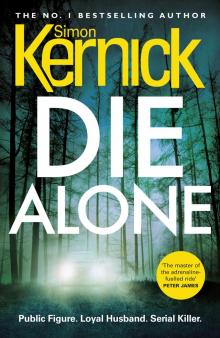 Die Alone
Die Alone Deadline
Deadline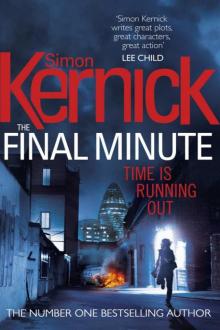 The Final Minute
The Final Minute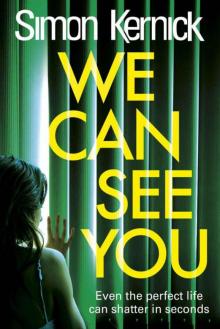 We Can See You
We Can See You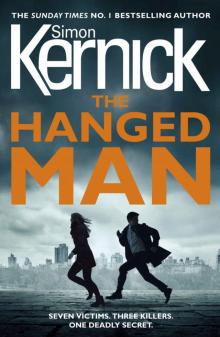 The Hanged Man (Bone Field 2)
The Hanged Man (Bone Field 2)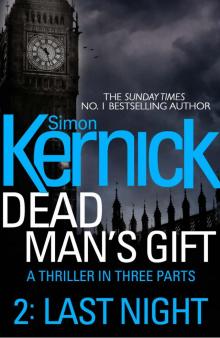 Dead Man's Gift 02 - Last Night
Dead Man's Gift 02 - Last Night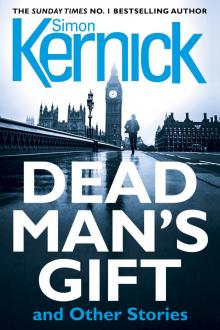 Dead Man's Gift and Other Stories
Dead Man's Gift and Other Stories A Good Day To Die
A Good Day To Die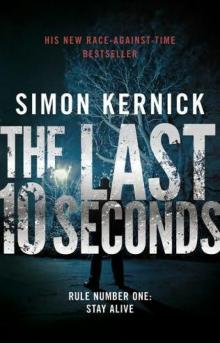 The Last 10 Seconds
The Last 10 Seconds The Murder Exchange
The Murder Exchange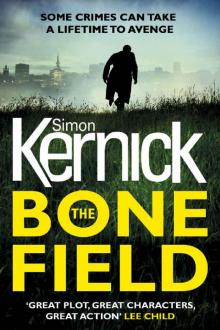 The Bone Field
The Bone Field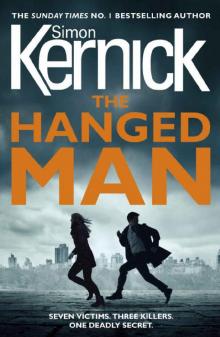 The Hanged Man
The Hanged Man Target
Target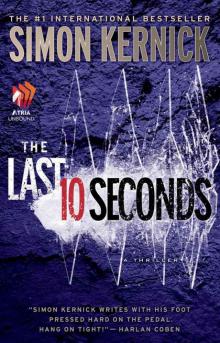 The Last 10 Seconds: A Novel
The Last 10 Seconds: A Novel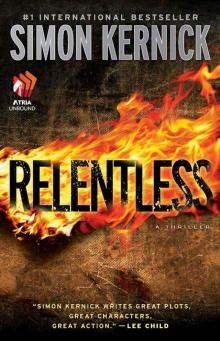 Relentless: A Novel
Relentless: A Novel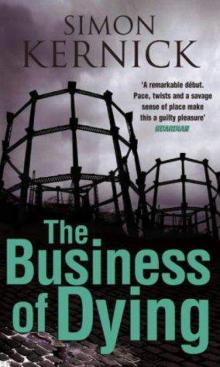 The Business Of Dying
The Business Of Dying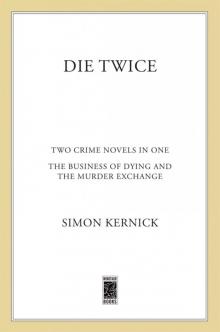 Die Twice
Die Twice Flytrap
Flytrap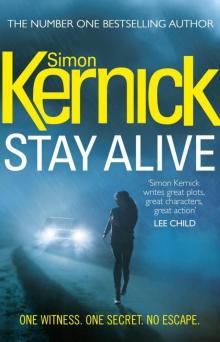 Stay Alive
Stay Alive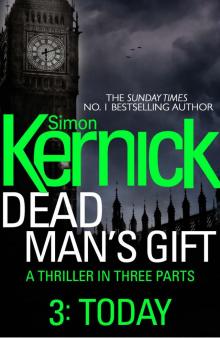 Dead Man's Gift 03 - Today
Dead Man's Gift 03 - Today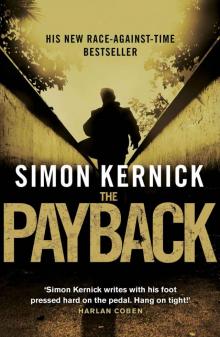 The Payback
The Payback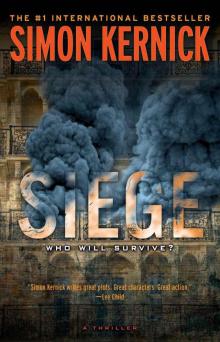 Siege: A Thriller
Siege: A Thriller The Crime Trade
The Crime Trade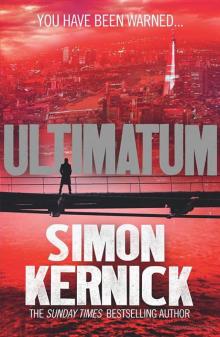 Ultimatum
Ultimatum